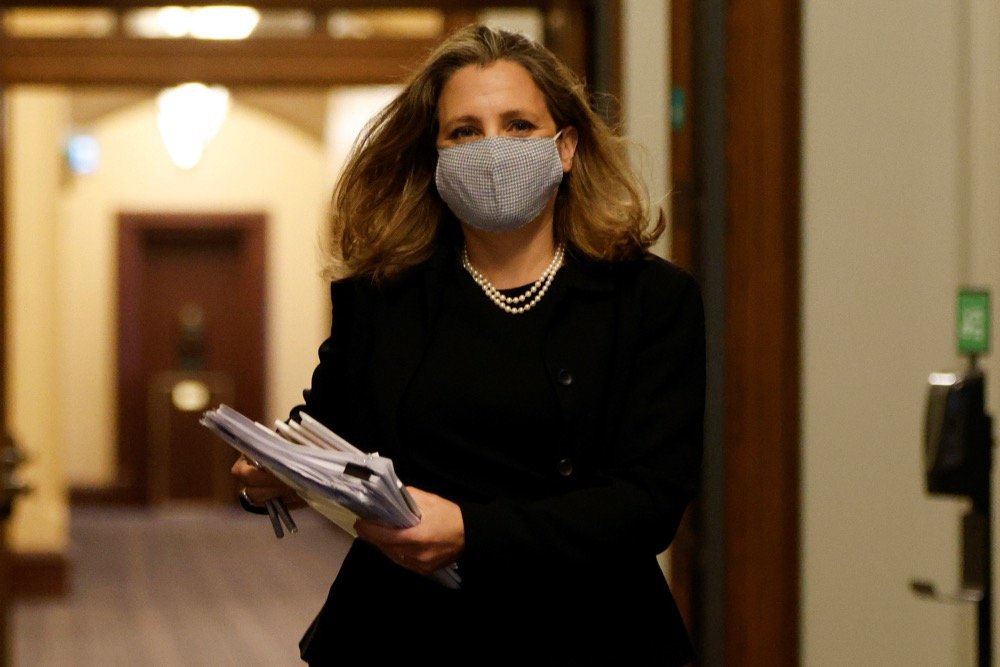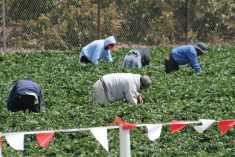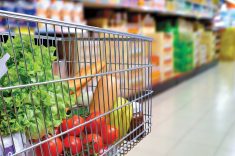Agriculture and agrifood sector stakeholders will learn Monday which of their requests make their way out of the pile and into a long-awaited federal budget.
Federal Finance Minister Chrystia Freeland’s 2021 budget is scheduled to be released Monday in the House of Commons, at about 4 p.m. ET.
Canadians didn’t get a 2020 budget: it was an early casualty of COVID-19, cancelled in the pandemic’s infancy. Economic updates and a series of spending announcements, almost entirely COVID-19-related, were released instead.
The Canadian Federation of Agriculture, for one, released its budget wish list back in August, offering three broad recommendations, each highlighted by specific measures that can be taken.
Read Also

Fifty-six per cent chance of more stable, ENSO neutral weather conditions in late summer and fall U.S. forecasters say
More stable weather due to El Niño-Southern Oscillation (ENSO) neutral conditions are likely in the Northern Hemisphere summer of 2025, with a 56 per cent chance in August-October, the U.S. Climate Prediction Center said.
To kick-start economic recovery, the CFA recommended the government restore the AgriStability payment trigger to 85 per cent and eliminate the cap to reference margins. A partial agreement with the provinces has since been reached to remove the reference margin limit.
Citing a $77 million investment from the federal government to help food processors combat COVID-19, the CFA says additional support is needed for the processing sector.
“To secure these critical food infrastructure links in advance of a second wave and the peak harvest season for many Canadian commodities, CFA recommends the next federal budget increase financial support to the food processing sector,” the federation’s document says.
“In addition to this support for existing food processors, CFA also recommends that the next federal budget invest in programming to support the development of more food processing facilities across Canada.”
Agriculture Minister Marie-Claude Bibeau has previously expressed interested in growing Canada’s regional food processing facilities.
CFA is also asking Agriculture and Agri-Food Canada “to reallocate underutilized AgriMarketing program dollars to implement a buy Canadian campaign for Canadian retail channels, and engage exporters to identify and address key export opportunities.”
The wish list also includes a call for better leveraging of agriculture’s environmental contributions, such as programs allowing “producers to generate credits for agricultural activities under both the Federal Greenhouse Gas Offset System and Clean Fuel Standard.”
Protocols for carbon offsets in some sectors of agriculture are currently in development, and CFA continues to lobby the government on this front.
Building resilience into Canada’s food system, through a $3 million investment, is another CFA ask. It proposes those dollars be used to reduce job vacancies “through career promotion, improve skills-training opportunities for workers, support human resource management training/certification, and support commercialization of labour-saving technologies.”
CFA also requests the federal government reinforce a $50 million fund targeted at reducing food waste.
For the 2021 budget, MPs on the Commons finance committee also recommend the federal government restore AgriStability levels to previous levels, create a national labour strategy for agri-food and develop a new business risk management program focused exclusively on climate change.
The multi-partisan committee heard testimony and received submissions from more than 800 groups and individuals. Mostly virtual meetings took place in December and a consultation report was released Feb. 16.
One recommendation is to “work with industry to develop a labour action plan for Canada’s agri-food sector.”
It’s a recommendation that will be welcomed by many in the industry. Food and Beverage Canada offered testimony to the committee and called for the development of a labour action plan.
The organization represents 1,500 food and beverage manufacturing businesses in Canada, and has long been a vocal supporter of developing such a strategy.
It released its own pre-budget consultation in August, which lobbied for a rebalancing of relationships across the supply chain.
The finance committee also recommended the creation of a new business risk management program focused on climate change.
Called AgriResilience, the program would be designed to “to help farmers transition to lower-carbon agriculture practices, thereby reducing the growing climate risk in this sector. An AgriResilience program would reward innovation and the adoption of new, more resilient farming practices, thereby helping to reduce climate risk.”
It’s an idea that originated from Equiterre, a Quebec-based environmental organization with ties to the Liberal cabinet via one of its founders, Steven Guilbeault, who is currently Canada’s minister of heritage.
Equiterre also recommended the federal government “adopt and fund a national strategy with nature-based solutions in the agriculture sector to limit growing GHG emissions and protect soil health.”
— D.C. Fraser reports for Glacier FarmMedia from Ottawa.















